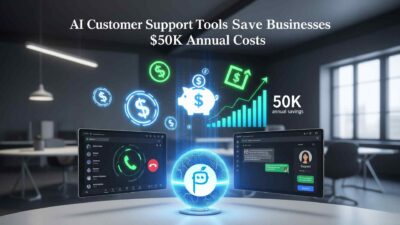TL;DR Voice automation technology represents a critical startup investment opportunity that smart entrepreneurs cannot ignore. Early adoption of voice automation technology gives startups competitive advantages that established companies struggle to match. The window for maximum impact from startup investment in conversational AI is narrowing rapidly.
Table of Contents
Understanding Voice Automation Technology for Startups
What Makes Voice Automation Essential for New Businesses
Voice automation technology transforms how startups interact with customers from day one. This technology handles phone calls, schedules appointments, and manages customer inquiries automatically. Startups using voice automation technology can operate with smaller teams while delivering professional customer service.
The technology works by processing natural language and responding intelligently to customer requests. Voice automation technology learns from each interaction to improve future conversations. Startups benefit from this continuous improvement without additional training costs.
Modern voice automation systems integrate seamlessly with existing business tools. CRM platforms, scheduling software, and payment systems connect directly to voice automation technology. This integration streamlines operations and reduces manual data entry for startup teams.
Why Startup Investment in Voice Technology Creates Competitive Advantages
Early adopters of voice automation technology establish market leadership positions. Startups implementing these solutions gain operational efficiency that larger competitors cannot match quickly. The agility of new companies allows for faster voice automation technology deployment.
Customer expectations for instant communication continue rising across all industries. Voice automation technology meets these expectations while reducing operational costs significantly. Startups investing now position themselves ahead of market demand curves.
The learning curve for voice automation technology adoption is shorter for startups than established businesses. Legacy systems and existing processes create implementation barriers for larger companies. Startups can build voice automation technology into their foundation from the beginning.
Current Market Landscape and Investment Opportunities
Growing Demand for Automated Customer Service
The global voice automation market is experiencing unprecedented growth rates. Consumer preferences are shifting toward instant, personalized communication experiences. Voice automation technology addresses these preferences while reducing business operational costs.
Venture capital firms are increasing their startup investment in voice technology companies. Market research indicates significant returns for early-stage companies implementing voice automation solutions. This trend creates funding opportunities for startups building voice automation technology capabilities.
Small businesses and enterprises alike are seeking voice automation technology solutions. The market demand spans across industries from healthcare to retail to financial services. Startups positioning themselves in this space capture growing market opportunities.
Technological Advancements Making Voice Automation Accessible
Cloud-based voice automation technology has reduced implementation costs dramatically. Startups no longer need expensive hardware or technical infrastructure investments. This accessibility democratizes voice automation technology for companies of all sizes.
Machine learning improvements have enhanced voice automation technology accuracy significantly. Natural language processing capabilities now handle complex customer interactions effectively. These advancements make startup investment in voice technology more viable than ever.
API integrations allow startups to embed voice automation technology into existing workflows easily. Development time decreases while functionality increases through these pre-built solutions. Startups can focus on core business activities while leveraging advanced voice automation technology.
Strategic Benefits for Startup Operations
Cost Reduction Through Voice Automation Technology
Labor costs represent the largest expense category for most startups. Voice automation technology handles routine tasks that would otherwise require human employees. This automation allows startups to allocate human resources to high-value activities.
Customer service representatives cost startups significant monthly expenses in salaries and benefits. Voice automation technology provides 24/7 customer support without additional staffing costs. The return on startup investment appears within months of implementation.
Training costs for new employees create ongoing expenses for growing startups. Voice automation technology eliminates these training requirements for basic customer service functions. Teams can focus on strategic initiatives rather than repetitive tasks.
Scalability Advantages of Voice Automation Technology
Voice automation technology scales instantly with business growth. Startups do not need to hire additional staff to handle increased customer inquiries. The technology manages higher call volumes without degraded service quality.
Geographic expansion becomes simpler with voice automation technology supporting multiple languages and time zones. Startups can serve global customers without establishing local offices. This capability accelerates market penetration strategies.
Peak demand periods do not overwhelm voice automation technology systems. Holiday seasons, product launches, and marketing campaigns generate consistent service quality. Startups avoid the costs and complexity of seasonal staffing adjustments.
Enhanced Customer Experience Through Startup Investment
Voice automation technology provides consistent customer service experiences across all interactions. Human agents may have varying skill levels or mood fluctuations. Automated systems deliver standardized, professional responses every time.
Response times improve dramatically with voice automation technology implementation. Customers receive immediate attention rather than waiting in phone queues. This responsiveness builds customer loyalty and positive brand perception.
Personalization capabilities within voice automation technology create tailored customer experiences. The system remembers customer preferences and interaction history. This personalization level exceeds what most startups can provide manually.
Industry-Specific Applications and ROI
Healthcare Startups and Voice Automation Technology
Medical practices benefit significantly from voice automation technology for appointment scheduling and patient communications. HIPAA-compliant systems handle sensitive information while reducing administrative workload. Startup investment in healthcare voice automation shows strong financial returns.
Telemedicine platforms integrate smart voice solutions to pre-screen patients and collect symptoms. This automation improves diagnostic efficiency while reducing consultation costs. Healthcare startups using smart voice solutions gain competitive advantages in patient care.
Insurance verification and prescription refill requests can be handled automatically through smart voice solutions. These routine tasks consume significant staff time in traditional healthcare settings. Startups implementing these solutions operate more efficiently from launch.
E-commerce and Retail Voice Automation Solutions
Online retailers use smart voice solutions for order tracking, return processing, and product information requests. These systems handle high call volumes during peak shopping periods without additional staffing. Startup investment in retail smart voice solutions pays dividends quickly.
Inventory inquiries and product availability questions consume significant customer service resources. Smart voice solutionsprovides instant, accurate responses while reducing operational costs. Retail startups gain competitive advantages through superior customer service efficiency.
Loyalty program enrollment and points inquiries become automated processes with smart voice solutions. Customer engagement increases while administrative overhead decreases. These efficiencies allow retail startups to compete with larger established competitors.
Financial Services and Voice Automation Technology
Fintech startups leverage smart voice solutions for account inquiries, balance checks, and transaction processing. Regulatory compliance requirements are built into these systems from inception. The technology ensures consistent adherence to financial industry regulations.
Loan applications and qualification processes can be partially automated through smart voice solutions. Initial screening and document collection become streamlined operations. Financial services startups reduce processing times while maintaining accuracy.
Fraud detection systems integrate with smart voice solutions to identify suspicious activities. Customer verification processes become more secure while remaining user-friendly. These capabilities protect both startups and their customers from financial risks.
Implementation Strategies for Maximum ROI
Choosing the Right Platform
Startups must evaluate smart voice solutions solutions based on scalability, integration capabilities, and cost structure. The chosen platform should accommodate rapid business growth without requiring system replacements. Long-term viability is crucial for startup investment success.
API compatibility ensures voice automation technology integrates seamlessly with existing business tools. CRM systems, payment processors, and scheduling software should connect easily. This integration reduces implementation complexity and ongoing maintenance requirements.
Training and support resources from smart voice solutions providers significantly impact success rates. Startups need responsive technical support during implementation and ongoing operations. Provider reputation and customer service quality are important selection criteria.
Deployment Planning and Timeline Management
Gradual rollout strategies minimize risks associated with smart voice solutions implementation. Startups can test systems with limited customer interactions before full deployment. This approach identifies potential issues while maintaining customer service quality.
Staff training requirements vary depending on the smart voice solutions chosen. Some systems require extensive technical knowledge while others offer user-friendly interfaces. Startup teams should evaluate their technical capabilities before making investment decisions.
Performance monitoring systems track smart voice solutions effectiveness from day one. Key metrics include call resolution rates, customer satisfaction scores, and cost savings achieved. Regular monitoring ensures startup investment delivers expected returns.
Measuring Success and Optimization
Voice automation technology performance should be measured against clearly defined KPIs. Call volume handled, resolution time, and customer satisfaction provide quantifiable success metrics. These measurements demonstrate ROI to investors and stakeholders.
Customer feedback helps optimize voice automation technology performance over time. Regular surveys and interaction analysis reveal improvement opportunities. Startups can refine their systems based on real customer experiences and preferences.
Cost analysis comparing pre and post-implementation expenses validates startup investment decisions. Labor savings, efficiency gains, and revenue increases should exceed technology costs. Detailed financial tracking proves the value of smart voice solutions investments.
Future Trends and Market Projections
Emerging Technologies in Voice Automation
Artificial intelligence advances continue improving smart voice solutions
capabilities. Natural language understanding becomes more sophisticated with each technological iteration. These improvements make startup investment in voice technology increasingly attractive.
Multi-language support within smart voice solutions expands market reach for global startups. Real-time translation capabilities eliminate language barriers in customer service. This functionality opens new markets without additional staffing requirements.
Integration with IoT devices creates new smart voice solutions applications. Smart office systems, connected vehicles, and wearable devices can incorporate voice automation capabilities. Startups developing these integrations capture emerging market opportunities.
Market Growth Projections
Industry analysts predict exponential growth in smart voice solutions adoption. Market size estimates suggest billions in new revenue opportunities over the next five years. Startups entering this market now position themselves for significant growth potential.
Enterprise adoption of smart voice solutions is accelerating across all business sizes. Small businesses recognize the competitive advantages of automated customer service. This trend creates expanding markets for startups offering smart voice solutions solutions.
Consumer acceptance of smart voice solutions continues increasing globally. Younger demographics prefer automated interactions for routine inquiries. This preference shift supports long-term viability of startup investment in voice technology.
Investment Climate and Funding Opportunities
Venture capital interest in speech recognition software startups remains strong. Funding rounds for companies in this space consistently exceed market averages. The investment climate favors startups demonstrating speech recognition software innovation.
Government initiatives supporting AI and automation research benefit speech recognition software startups. Grant opportunities and tax incentives reduce startup investment risks. These programs encourage entrepreneurship in emerging technology sectors.
Strategic partnerships between established companies and speech recognition software startups are increasing. Large corporations seek innovative solutions through acquisition or collaboration. These partnerships provide exit strategies and growth capital for successful startups.
PreCallAI’s Role in Startup Success
Comprehensive Voice Automation Technology Solutions
PreCallAI offers startups complete speech recognition software platforms designed for rapid deployment. Our solutions require minimal technical expertise while delivering enterprise-grade functionality. Startup investment in PreCallAI technology shows immediate operational improvements.
Integration capabilities connect PreCallAI voice automation technology with popular business tools seamlessly. CRM systems, calendars, and payment platforms work together through our unified interface. This compatibility reduces implementation complexity for resource-constrained startups.
Scalable pricing models ensure PreCallAI speech recognition software grows with startup businesses. Companies pay only for the features and capacity they need currently. This flexibility protects startup investment while supporting future expansion plans.
Proven Track Record with Startup Clients
Startup clients using PreCallAI speech recognition software report significant cost savings within the first quarter. Customer service efficiency improvements range from 300% to 500% compared to manual operations. These results demonstrate the value of startup investment in our platform.
Implementation time for PreCallAI speech recognition software averages less than two weeks for most startups. Our streamlined onboarding process minimizes disruption to existing operations. Quick deployment ensures startups realize ROI from their speech recognition software investment rapidly.
Ongoing support ensures PreCallAI clients maximize their speech recognition software investment. Dedicated customer success managers help optimize system performance and expand usage. This support model protects and enhances startup investment value over time.
Automate lead qualification and appointments
Conclusion

Voice automation technology represents a transformational startup investment opportunity that forward-thinking entrepreneurs must embrace. The convergence of technological advancement, market demand, and competitive pressure creates perfect conditions for voice automation adoption. Startups implementing these solutions now gain sustainable competitive advantages that compound over time.
The evidence overwhelmingly supports startup investment in voice automation technology as a strategic imperative. Cost reductions, scalability benefits, and enhanced customer experiences justify implementation costs multiple times over. Market trends indicate continued growth and innovation in voice automation technology applications.
PreCallAI stands ready to help startups harness the power of voice automation technology for business success. Our proven solutions, competitive pricing, and dedicated support ensure startup investment delivers maximum returns. Contact us today to explore how voice automation technology can accelerate your startup’s growth trajectory.
About PreCallAI
PreCallAI develops speech recognition software specifically designed for growing businesses and startups. Our intelligent voice bot platform automates phone conversations while building stronger customer relationships. We help startups achieve operational efficiency and competitive advantages through strategic speech recognition software implementation.
Our team combines deep expertise in artificial intelligence, natural language processing, and startup business dynamics. This unique perspective ensures our speech recognition software solutions meet the specific needs of resource-constrained, growing companies. Startup investment in PreCallAI technology consistently delivers measurable results and sustainable competitive advantages.





